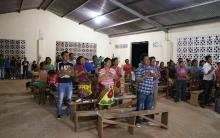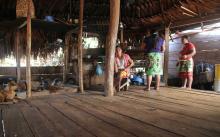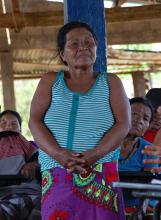With the future of the Wounaan indigenous people of Panama being chopped down before their eyes, the largely Mennonite leadership of the group is asking the global Mennonite community to stand with them, and kneel with them in prayer for fair treatment.
The Wounaan are known for carvings they make from hard, rich cocobolo wood, but this wood is in high demand and the logging of cocobolo by outside interests is creating an ever deepening crisis for the Wounaan.
Though the Panamanian government has designated a large tract of land in the eastern part of the country as belonging collectively to the Wounaan, it has turned a blind eye as outsiders brazenly move in, harvest trees, clear forest for grazing, and sometimes threaten Wounaan villagers.
Last February, Mennonite World Conference (MWC) sent a delegation of four people, each from a different continent, to visit the Wounaan. Jack Suderman, a Canadian with extensive experience in neighbouring Colombia, was among them. Gladys Siemens from Brazil, Joji Pantoja of the Philippines and Henk Stenvers of the Netherlands were the others. The delegation travelled to Rio Hondo, Rio Platanares, and Majé, three small villages in the jungle, without phone service, an electrical grid, and accessible only by boat. There, the delegates heard hours of accounts of the incursions by outsiders.
Suderman said the clear-cut areas were easy to spot throughout the mountainous region, some less than a 20-minute walk from the villages. Suderman said “invaders” come in with bulldozers and semi trucks to indiscriminately cut trees. In some cases they build cabins and bring in cattle.
The delegation heard “story after story” of villagers going to their fields only to find them “taken over” by people threatening to shoot the locals.
“They are rapidly loosing their land,” Suderman said. A common refrain was: “So now we don’t know what to do.”
The encroachment not only robs villagers of wood and their ability to feed themselves, but it increases erosion and environmental degradation. And it creates a climate of constant fear.
The MWC delegation also attended a worship service in each of the three communities. While about 600 of the roughly 15,000 Wounaan are Mennonite, all of the members of the Wounaan tribal government attend Mennonite churches.
These churches date back to the late 1950s when Mennonite Brethren anthropologist Jacob Loewen moved to Panama. Previously based in Colombia, which is also home to Wounaan people, Loewen had been working on a translation of the Bible into the Wounaan language. When changes to Colombian visa policy forced him out, Loewen went to neighbouring Panama to complete the task. There are now 13 Mennonite Brethren churches in Panama, predominantly in outlying villages and predominantly made up of Wounaan peoples, with some Embera people as well.
Suderman, who also visited Panama last year, said he was particularly impressed with the degree of organization among the Wounaan leadership. They have carefully mapped their territory, including identification of thousands of cocobolo trees at various stages of development, and created a long-term plan for harvesting and replanting the trees in an economically and ecologically viable way. “They understand that to be their future economically,” said Suderman.
But each tree that is hauled away by outsiders undermines the plan and the future of the Wounaan.
In 2012, one Wounaan villager and one logger died in an armed altercation. Now, Wounaan leaders, in keeping with their Mennonite faith, are trying hard to keep the struggle non-violent. Mennonites from Colombia have been brought in for non-violence training and MWC has notified its networks of the request for more training in conflict transformation. But the MWC delegation was repeatedly told, “The young people are losing patience.”
Following the delegation’s visit, MWC notified Mennonites around the world of the request to pray for the Wounaan and arranged for Wounaan representatives to share their story at the MWC assembly in Pennsylvania. It is also working on a statement of solidarity with indigenous peoples.
In June, MWC sent a letter to key ministers in the Panamanian government regarding Wounaan concerns. Wounaan leaders report that shortly thereafter, key government representatives not only met with them but travelled to the jungle to do so. They also report that three Wounaan men sentenced to 20-year prison terms on false charges inexplicably had their charges dropped.
The Wounaan, who had considered launching a more concerted international campaign, are now weighing their options and watching for follow-through on government commitments.
Suderman said Wounaan leaders took encouragement from the fact that MWC representatives from four continents came to visit them. They also place great confidence in the prayers of Mennonites around the world. Their primary request is for prayer. See below for a prayer used at MWC assembly.
See more on the Wounan people.
Prayer
The Commission of Diaconia and Peace of the Iglesia Evangélica Unida Hermanos Menonitas de Panamá (United Evangelical Church: Mennonite Brethren of Panama) has requested that God’s people around the world pray this prayer on their behalf.
Creator God of Justice, Peace, Love and Mercy:
You know the struggles of your people.
You know the struggles of the Wounaan People of Panama: a struggle for justice related to their ancestral domain amid the continuing invasions of those lands.
We pray to you.
We lament the ongoing loss of valuable resources of the Wounaan people.
We pray that the government of Panama might act to secure the collective title to the land.
We pray to you for justice in the case of the three men who have been falsely accused and condemned to 20 years of prison due to their leadership in this struggle for land.
We pray for your justice in the legal processes led by their lawyer Leonidas Quiróz; processes that still seem to be without the sympathetic ears and hearts needed to resolve these struggles.
We pray for wisdom and patience for the local pastors and conference leaders of the United Evangelical Church: Mennonite Brethren of Panama.
We give thanks for their firm commitment to keeping this struggle free of violence.
We give thanks for their concerns for the life-giving flora and fauna created to secure life for generations to come.
We give thanks for their wisdom and patience.
We give thanks that they are your people and you are their God.
Thank you God for listening to our lament. Thank you for knowing the integrity of our hearts. Thank you that your will is the welfare of all your creation.
May your will be done.
Amen.

A Mennonite World Conference delegation attended a worship service at the Mennonite Brethren church in Majé, Panama, in February 2015. (Mennonite World Conference photo by Henk Stenvers)




Add new comment
Canadian Mennonite invites comments and encourages constructive discussion about our content. Actual full names (first and last) are required. Comments are moderated and may be edited. They will not appear online until approved and will be posted during business hours. Some comments may be reproduced in print.